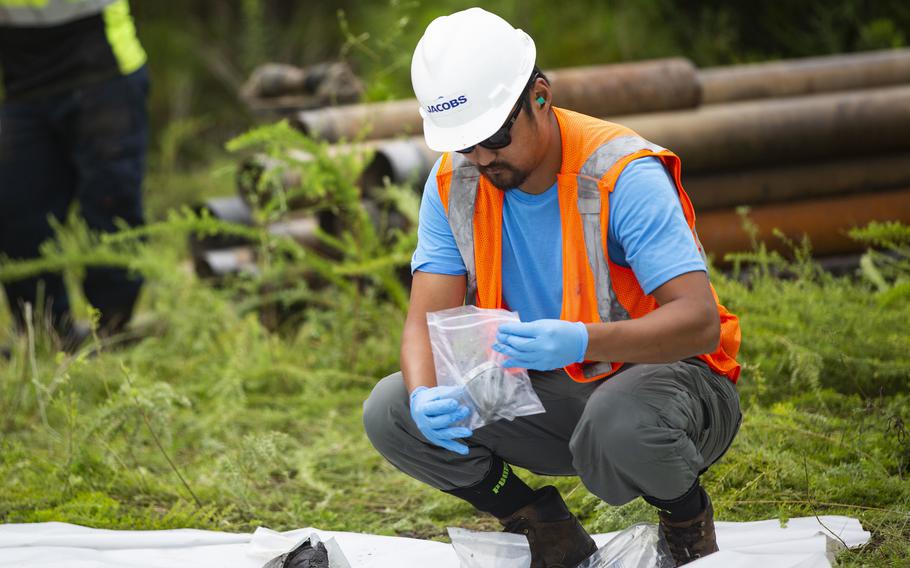
A radiological engineer gathers soil samples to be tested for Per- and Polyfluoroalkyl Substances (PFAS) on Marine Corps Base Camp Lejeune, North Carolina, Aug. 19, 2020. PFAS are man-made chemicals commonly used for clothing, food packaging and carpeting and have the potential to be toxic. Frequent testing is done to ensure drinking water on MCB Camp Lejeune and MCAS New River is safe. (Christian Ayers/U.S. Marine Corps)
SCRANTON, Pa. (Tribune News Service) — Sgt. Don Wilmot began noticing negative health effects from the contaminated water at Camp Lejeune several years after leaving the base.
During a question-and-answer session at the Marine Corps League Northeast Detachment on Alder Street Sunday afternoon, attorney Scott Schermerhorn, a former officer in the Marine Corps’ Judge Advocate Division, offered advice to Wilmot and other veterans and their families about filing claims for compensation through the Camp Lejeune Justice Act of 2022.
The act allows people to sue to recover damages for harm suffered by exposure to water contaminated by toxic substances at Camp Lejeune in North Carolina between Aug. 1, 1953, and Dec. 31, 1987. Anyone who was exposed for at least 30 days is eligible.
U.S. Rep. Matt Cartwright, D-8, Moosic, wrote the bill, which was folded into the Sgt. First Class Heath Robinson Honoring our Promise to Address Comprehensive Toxics Act, or PACT Act, President Joe Biden signed into law on Aug. 10, 2022.
Those affected by the contamination have until Aug. 10, 2024 to file a claim and Schermerhorn recommends consulting with an attorney before starting the process.
In 1982, the Marine Corps discovered specific volatile organic compounds in the drinking water provided by two of the eight water treatment plants at Camp Lejeune, according to the Agency for Toxic Substances and Disease Registry. Up to one million military and civilian staff and their families may have been exposed to the contaminated drinking water, the agency found.
For decades, many Camp Lejeune trainees who suffered cancer and other maladies from the contamination couldn’t get compensated for medical bills or other costs.
Wilmot, 79, of Sterling Twp., served with the Marines at Camp Lejeune for 42 days in 1962 and four months in 1965.
He feels the passing of the PACT Act last year was long overdue.
“I started seeing symptoms when I came home from Vietnam in 1967, but at that time nobody acknowledged there was any kind of problem,” Wilmot said. “This should have happened years and years ago.”
More than 60,000 claims have been filed with the Department of the Navy since last August, but nobody has received payment, Schermerhorn said. He noted about 1,100 claims are pending in court in the Eastern District of North Carolina.
“Not one claim has been paid by the government, which is kind of a travesty to think about, but they started from scratch and they’re building the infrastructure,” he said.
He expects payments to begin being doled out by the end of 2023. As many as 1 million to 1.2 million claims are expected to be filed with payouts awarded through 2033, Schermerhorn said.
“Most people think it’s all veterans, but there are children and spouses, and civilian employees working on the base, who were consuming the water,” he said.
Schermerhorn has worked on veterans claims for about 28 years and his daughter, Madison, also an attorney, specializes in Camp Lejeune claims for his Scranton firm.
“Veterans work is the most satisfying aspect of my law practice because it changes lives for all the right reasons,” he said. “There is no better feeling than when I get a decision after a hard fight, and somebody gets a rating that is going to make a difference in their life.”
He estimates the firm receives a minimum of one to two new requests per week.
Paul Carachilo, 74, of Carbondale, who served at Camp Lejeune with the Marines in 1966 and 1967, was diagnosed with stomach cancer in 2010 and underwent radiation. He believes the Camp Lejeune Justice Act of 2022 is a positive step but noted it should be easier for veterans and their families to receive help.
“I think everybody should be compensated that was there and not have to jump through hoops,” Carachilo said.
(c)2023 The Times-Tribune (Scranton, Pa.)
Visit The Times-Tribune (Scranton, Pa.) at thetimes-tribune.com
Distributed by Tribune Content Agency, LLC.